Are you feeling lost in the middle of a messy life? Well, it happens to everyone. I’ve experienced that too.

As a matter of fact, this week, I’m setting up my life for the upcoming year, even though it hasn’t begun yet. I’ve been doing this since my life became busy and unorganized, and my goal is to bring it back on track before the new year.
So, if managing all your responsibilities stresses you, and you’re anxious about all you have to do, it’s time to initiate an organizational strategy.
This guide, “How to organize your life in one week,” gives you simple, clear steps to tidy up your life in 7 days. It’s direct, easy to understand, and it works.
You can encounter phases of disorderliness. The essential point is that it’s within your control to restore order and start structuring things.
You don’t need an abundance of time – a week can result in a remarkable change!
In his book Atomic Habits, James Clear advocates that focusing on sequential, small changes is the secret to successful habit formation.
You can use the same concept here because trying to organize your life can sometimes feel like an uphill battle.
Therefore, I’ve broken the task into a week’s worth of simple steps with diverse life categories to help you reclaim authority over your daily routine and commitments.
So hang on to find out more.
Table of Contents
The One-Week Action Plan for Organizing Your Life
Bringing order to your life is a powerful strategy for simplifying tasks and improving productivity.
Below is a straightforward guide to help you restructure your life for a week:
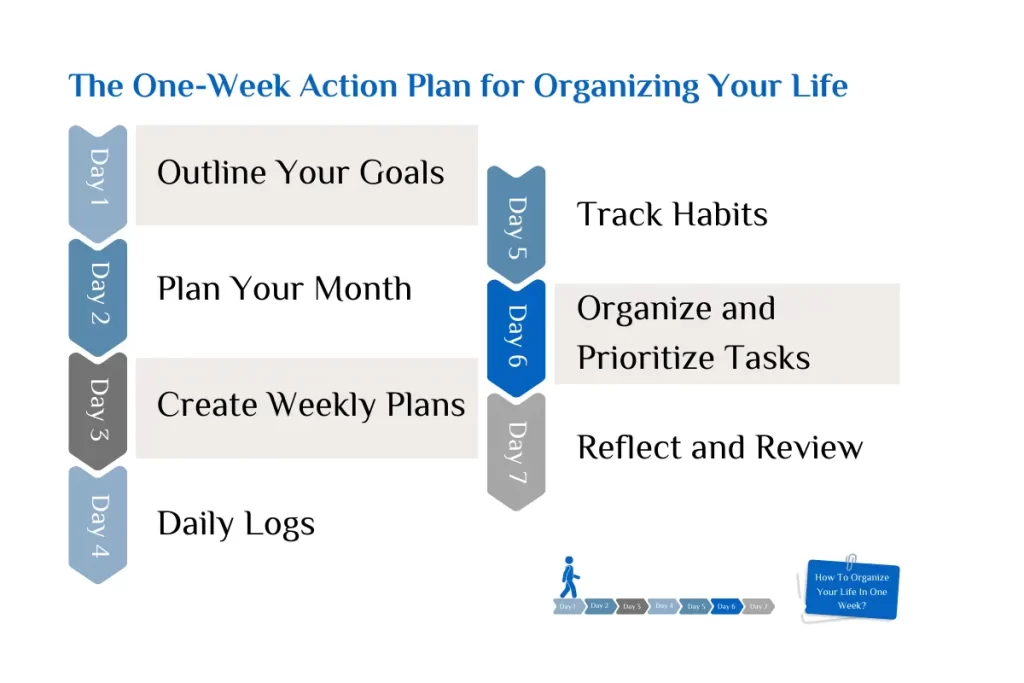
Day 1: Outline Your Goals
Outlining your goals is like scheduling a series of training sessions for a marathon. You jumpstart this process by reflecting, “What victory do I crave?”
For instance, if joining a marathon is your aim, your first step might be mastering a one-mile run. Progressively increase the distance to two miles and keep advancing.
You can outline your goals via the SMART method:
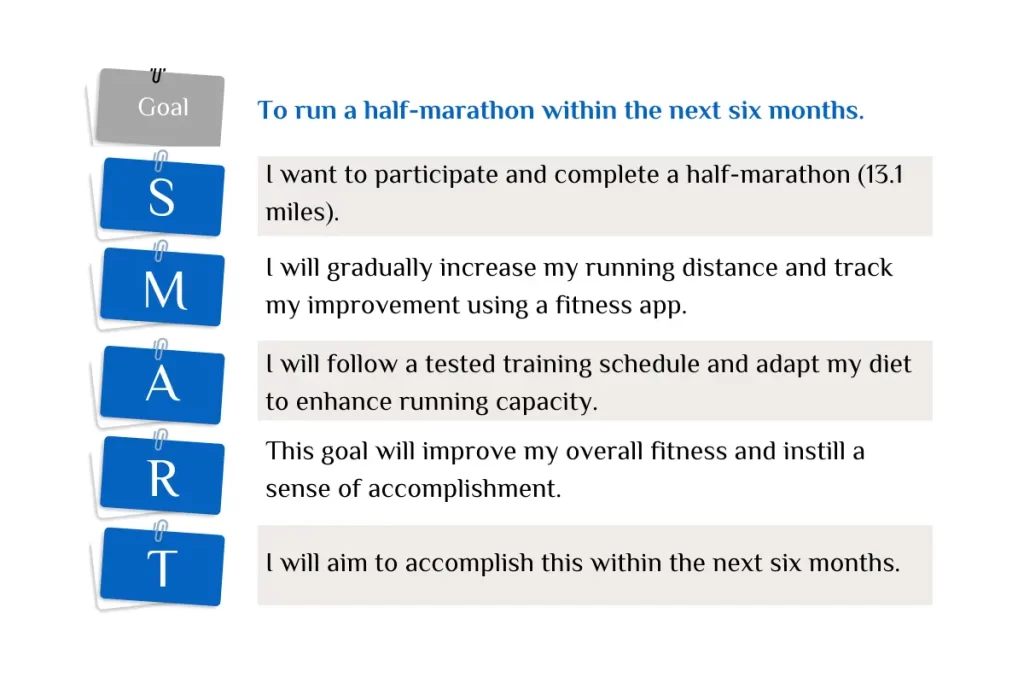
The Harvard Business Review suggests that clearly defining your goals stops you from settling for “good enough” [1].
Simply put, if you know exactly what you aim to achieve, you won’t accept anything less. It is true because having clear goals can push you to reach further rather than settling for average results.
It might be overwhelming initially, but building the Great Wall didn’t happen in a day. Progress at your speed and make each step precise yet within your means.
Note: The goal at this point is progress, not perfection.
As you map out your goals, you should embrace flexibility. Because planning your life isn’t about fixed rules; it’s more about carving out a path that leads to your dreams.
Day 2: Plan Your Month
Reserve one or two pages for a monthly chart. On this, you can flag momentous days and deadlines. It eventually serves as a monthly schedule to give you a snapshot of your upcoming month.
Do you have must-remember dates like birthdays or anniversaries coming up?
Are any work or school deadlines pending?
You should write them all down. It will help plan out the month ahead in an organized manner.
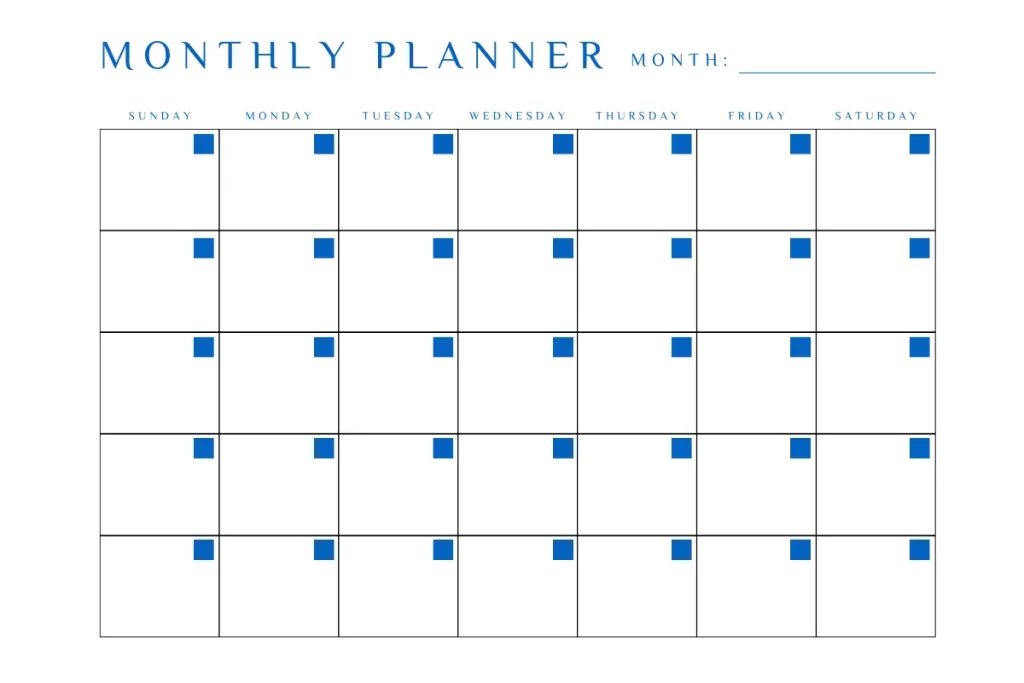
Next up, focus on your self-growth plans. You might have decided to get through two books this month, or perhaps there is a hobby you wish to allocate more time to.
Do remember to dedicate timetable space for such personal interests. They are as important as anything else.
Moreover, keep sight of daily chores. Grocery shopping, bill management, and laundry can add up if you procrastinate.
How about setting clear days for handling these? It can alleviate the anxiety associated with waking up to unfinished tasks.
Try to allocate some ‘me-time’ as well. You could take a reflective walk in the park or treat yourself to a chilled movie night, complete with popcorn.
As I set up my monthly plan, I look for successful people who have already done it well. I found a minimalist bullet journal guide to organize short- and long-term goals.
You may also benefit from it if you want to use a bullet journal.
Feel free to modify the plan based on your weekly commitments or mood. The purpose is to chart a path, not impose restrictions.
Day 3: Create Weekly Plans
Weekly planning acts as your GPS through the seven-day trip to help you reach Friday without unwanted side tracks.
An article from Harvard’s Academic Resource Center suggests the chances of accomplishing your work increase if you make a weekly plan as it structures your time [2].
I find this true. I’m more productive and focused when I plan my week.
Let me guide you through it.
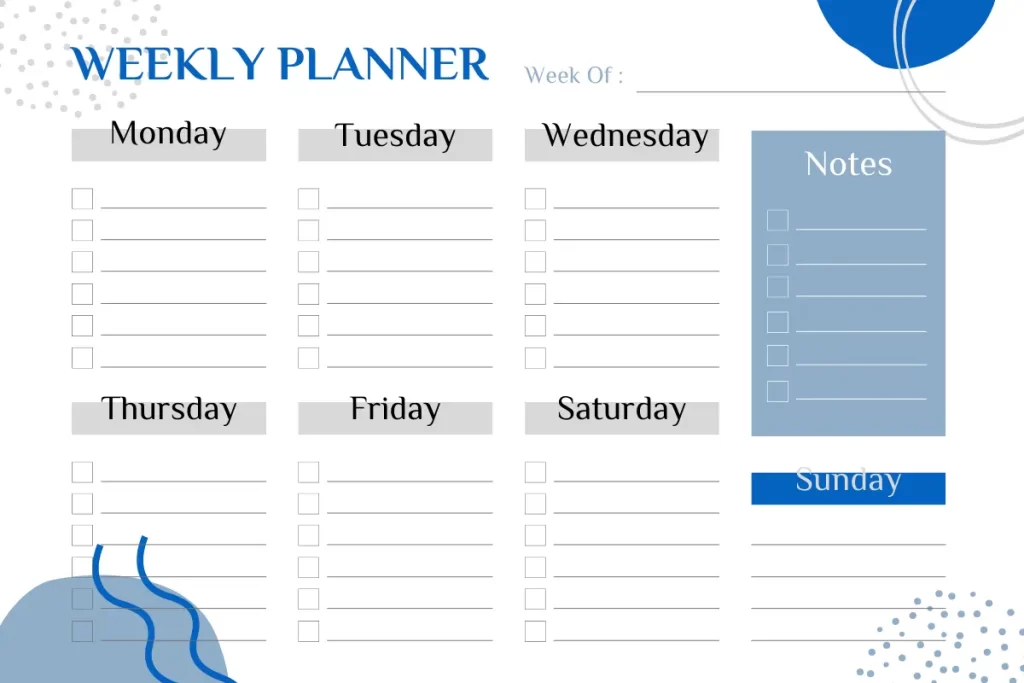
Start with your big items.
- What key outcomes are you seeking in the week ahead?
- What would you like to have completed by the weekend?
- Compile a list of these items, then arrange them in priority.
Next, split each goal into several portions, each a step towards its achievement.
Make sure that every task is defined clearly so that if someone else were to read, they could grasp what you need to accomplish.
For example, if your target is to have the book proposal ready by Friday, one step could be “craft the first draft of the proposal.”
It grants you a clear roadmap and makes it easier to decide where you should consciously invest your time.
Day 4: Daily Logs
Provide a page for each day to record tasks in greater detail. It promotes focusing on each day in isolation to ensure optimal time use. This practice would expose your patterns that enhance your productivity.
Incorporate the following details:
- The date and time.
- An in-depth task outline stating the beginning and ending times (if applicable).
- Record any hindrances faced.
- Tasks you finished during the day.
- Acknowledge your most impactful achievements.
- Identify problematic tasks or initiatives and explain the reasons.
- How can you prep for the next day to sidestep these issues?
Optimize this page by logging your daily actions and thoughts. It will provide insight into why some days were more productive than others.
From personal experience, being aware of time-consuming tasks and finding ways to simplify them can make a huge difference. It not only saves my time but also reduces unnecessary stress.
Day 5: Track Habits
Habit tracking mirrors the feedback provided by your scorecard. It reveals insights about your daily activities that cultivate the good and expel the not-so-good ones.
We hardly notice habits because habits are so ingrained; however, regular logging allows you to evaluate and interpret your patterns. Using a habit tracker is a powerful tool to instill healthy routines.
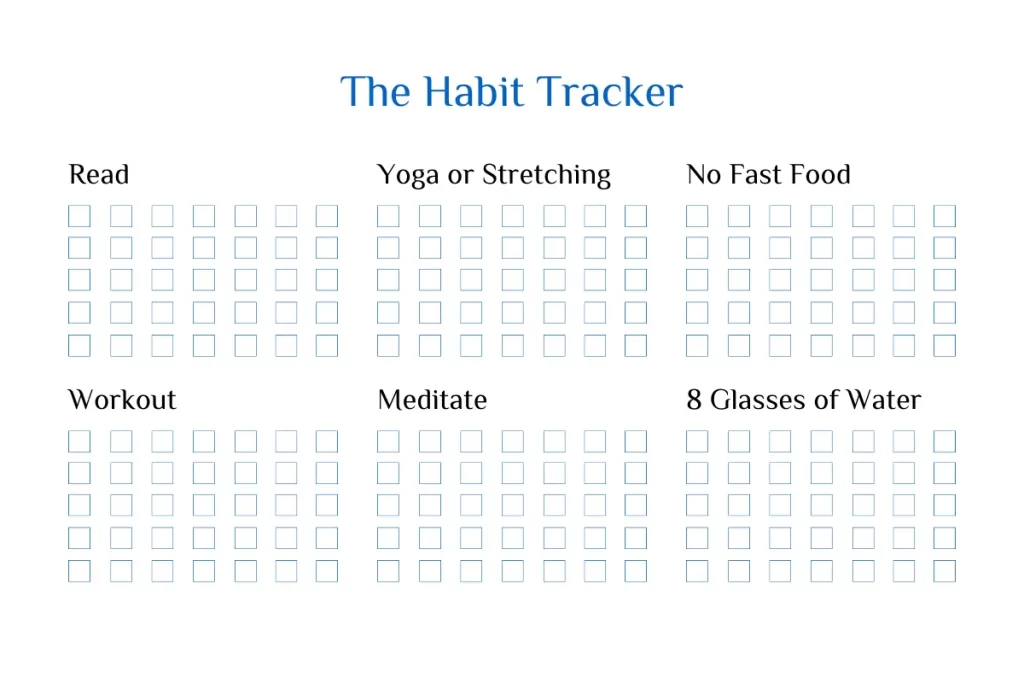
To begin, identify habits you want to track. It can be an uncomplicated checklist where you mark daily routines like working out, staying hydrated, reading, etc.
You’d be surprised how much small habits can significantly impact, so notice them! Every little step matters.
Next up is picking a method to track your habits. Some are into digital apps, and others prefer the tried-and-true pen-and-paper combo. Discover what gets you going and keep with it.
Additionally, I recommend Cal Newport’s blog, Text File Time Blocking, to help you get started with a simple habit tracker. He emphasizes the simplicity of building habits, and his blog is an excellent outlet for learning how to do so effectively.
You need to understand that habit tracking is all about consistency.
Document your habits each day, and the patterns will shine through. This steady practice can help you derive what’s fruitful and needs some fine-tuning.
Day 6: Organize and Prioritize Tasks
Arranging and ranking data might initially feel tedious, but it will simplify your decision-making and troubleshooting.
Where should you begin with organization and prioritizing?
Let’s break it down.
Step one: sort the urgent and non-urgent. Often, you’ll find that only some of the tasks you hold are applicable or important.
You should focus exclusively on the information that contributes to your goal.
Next, categorize your tasks. This could indicate classifying it according to time context, geographic information, theme, or other benchmarks suitable for your task.
I’m splitting your life aspects into clear sections. You can check the categories below and see how to break down your life into different areas.
- Personal goals
- Work/Professional goals
- Financial management
- Health and wellness
- Home organization
- Social relationships
- Education and personal growth
You can compare this step, like arranging books on different shelves based on genres to create a clear view of what you’re working with. I’ll elaborate on each category further down in the article.
After categorizing, it’s time to prioritize. Recognize which categories need immediate attention.
Strive to balance tackling high-priority tasks and not neglecting those that seemed less so.
Lastly, don’t shy away from reworking your organization system. Sometimes, even the best-planned systems need minor refinements.
Day 7: Reflect and Review
Create a reflective zone.
Use this dedicated section to:
- Record your wins
- The aspects that need more work
- Your emotional states
- Any other ideas to shape your goals
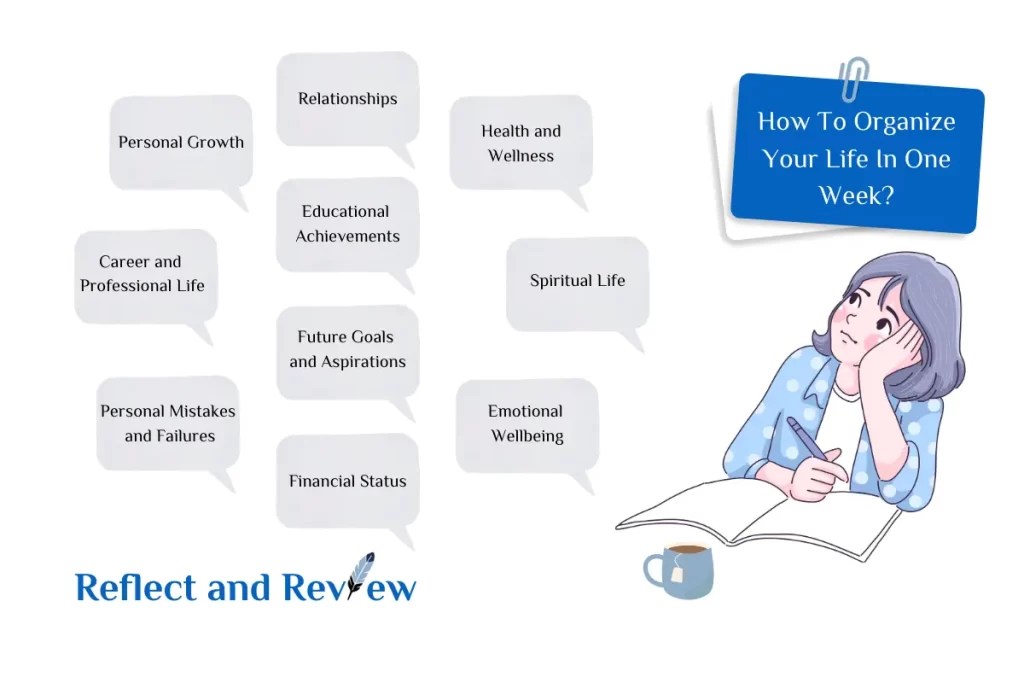
Reflecting and reviewing operate as a ‘silence’ moment during activities to understand where you exactly stand.
To push on, initially establish an uninterrupted, quiet moment. Serve a soothing cup of tea, settle into a spot you love, and you’re on to a good start.
Reflect on the missions you set for yourself.
Did you accomplish them? If indeed, well done!
But, if not, there’s your area to improve. Consider the challenges you faced and think about ways to overcome them.
Be candid while showing self-love. You’re not here to bet yourself but to observe and enhance.
- What went well?
- Which parts went according to plan?
- What have you learned?
- How can you apply it in the future?
Upon careful reflection, the next step is review.
How will these gleaned insights shape your plans and aspirations? You may need more recreational time or more effective time management.
Reflecting and reviewing helps sharpen your understanding and refine your plans. Don’t forget, it’s all about steady growth and preparing the grounds for new victories.
Categories to Organize Your Life in One Week
I’ve broken down seven crucial life aspects for you to concentrate on. This helps pinpoint which areas require immediate improvement and how to sequence them.
You may also use this list as a starting point to brainstorm your categories.
The seven areas of life include:
- Personal goals: Highlight what you intend to achieve regarding health goals, hobbies, personal interests, and relationships.
- Work/Professional goals: Lay out your work responsibilities, projects, and professional development goals for the coming week and into the future.
- Financial management: Establish a spending plan, tallying all your financial outflows. If you have debts, create a payment plan.
- Health and wellness: Devise your dietary charts, construct a regular physical workout routine, and don’t forget self-care activities to keep your mental health in check.
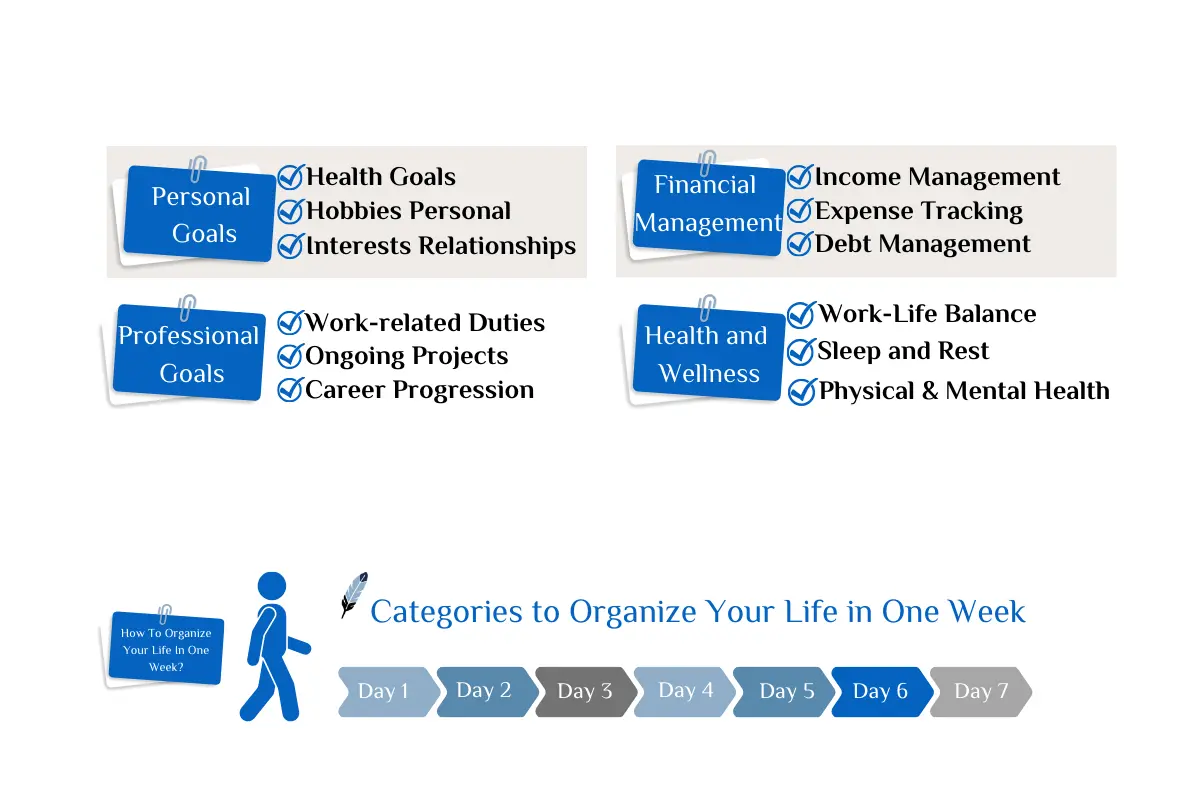
- Home organization: Spare time for home cleanup to clear your mind. Do some tidying, clear out clutter, and create designated storage spots.
- Social relationships: Connect with friends and schedule quality time with family. Besides this, line up any near future social occasions and duties.
- Education and personal growth: Set aside periods for personal gain, be it picking up a new skill, reading, or enrolling in a learning course.
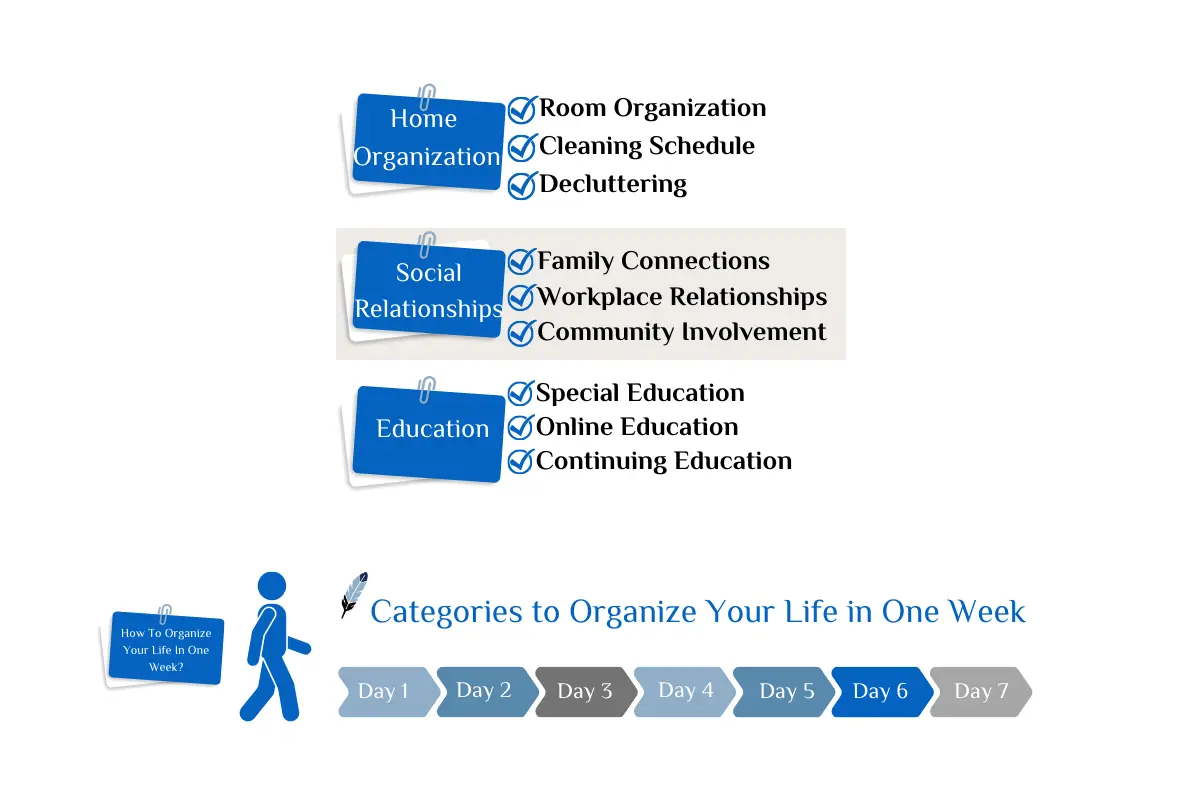
Managing your life’s chaos one part at a time gives you a structured approach and feels less intimidating. After one week of thorough organizing, routinely maintain and revise each step.
Benefits of Organizing Your Life in One Week
Organizing your life for one week is like the first week of school. You’re excited and motivated but don’t know what you’ll be doing yet.
Here are some positive outcomes you’ll receive when you systematize your life in one week:
- Improved productivity
- Stress reduction
- Better time management
- Increased efficiency
- Improved mental clarity
- Financial management
- Enhanced work-life balance
- Boosted mood
- Better health
- Increased control
It takes a few days to figure out how much time everything will take, but the benefits that flow are significant.
How to Organize Your Life with a Notebook?
A simple notebook can be your go-to tool because it is easy to carry, customizable, and helpful in keeping thoughts and tasks in one place.
But I’m not surprised if you’d opt for digital tools in planning.
However, I’ve learned through research and personal experience that a notebook provides a much more personal touch and delivers promising results.
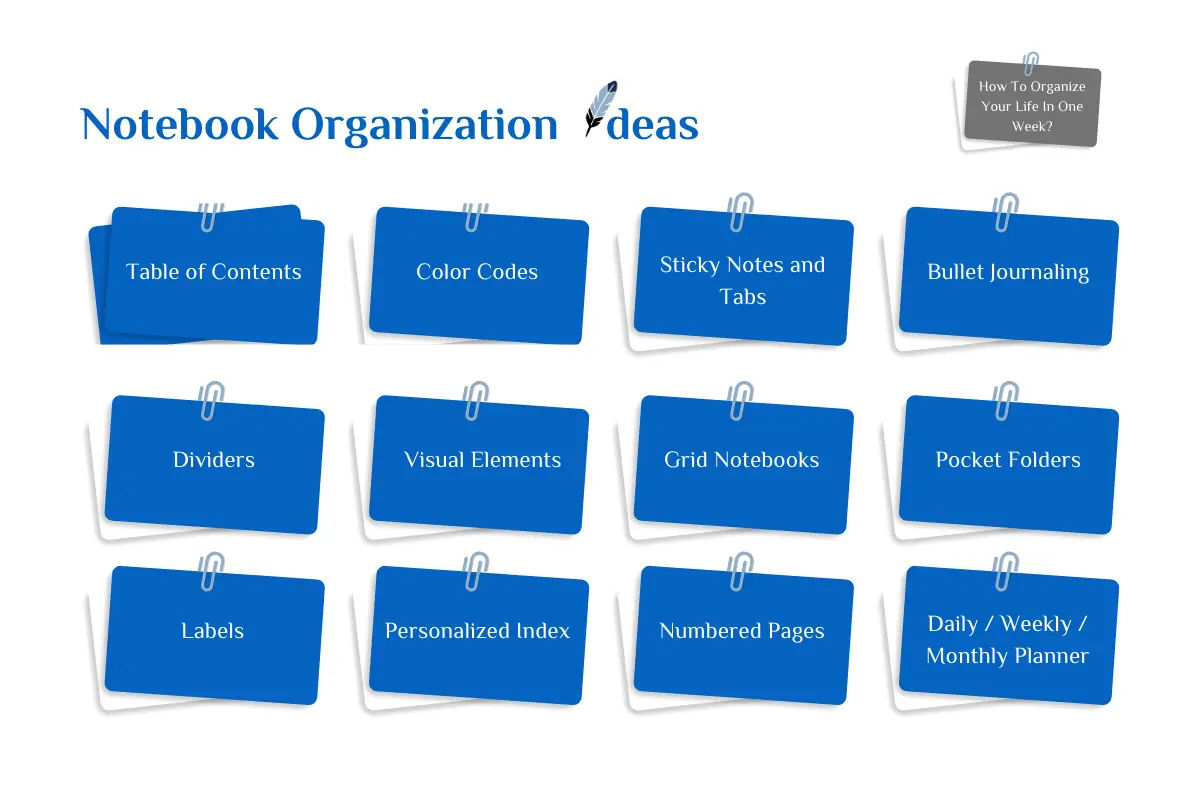
Below are efficient strategies for transforming your notebook into a practical life scheduler.
- Table of contents: Set up your notebook with a table of contents for quick access to various topics.
- Color codes: Adopt a color-coding system for different categories or tasks—for example, blue for work-related tasks, green for finances, yellow for personal development, etc.
- Sticky notes and tabs: Use them to spotlight noteworthy sections or pages or to enhance a page with extra bullet points.
- Bullet journaling: Bullet journals merge functionalities of to-do lists, planners, and diaries. It proves to be a top-notch means to sort out your life.
- Dividers: Break your notebook into sections like a scheduler, task tracker, habit logbook, and journal using tabs or stickers.
- Visual elements: Draw or apply graphic organizers like mind maps and diagrammatic flows to envision strategies or concepts. Maintain a dedicated zone for artistic scribbles to boost imaginative thinking.
- Grid notebooks: Matrix-style notebooks are efficient tools for crafting visual graphics and organizing particulars.
- Pocket folders: Integrate pocket folders to hold slips, bills, or important papers you might need later.
- Labels: Establish a customized glossary at the back of your notebook to keep tabs on significant terms referenced in your desired content.
- Personalized index: Construct a custom glossary at the rear of your notebook to follow up on tracking the keywords used in your notes.
- Numbered pages: Label each page with a numerical marker to ensure smooth referencing, primarily when operating with a detailed table of contents.
- Daily/Weekly/Monthly planner: Assign pages to map your plans for each day, week, or month.
How To Organize Your Life In One Week? (FAQs)
How do I start organizing my life?
To initiate a well-organized life, you should:
• Identify your goals
• Set priorities
• Structure a routine
• Clear out clutter
• Make the most of tools like schedules or project management applications
• Develop favorable practices
• Perpetually reassess and alter your strategies if necessary
How can I get organized in a week?
To get organized in a week, allocate different tasks for each day.
For instance:
• Decluttering
• Organizing finances
• Planning meals
• Eating healthy
• Working out completing a task list
• Keeping your schedule organized
• Sorting digital space
• Use tools like to-do lists and planners
• Maintain consistency in your efforts throughout the week.
How do you manage your daily life?
Navigating daily life involves managing roles from work, personal entertainment, and care. Successful administration includes:
• Setting daily goals
• Adhering to routines
• Maintaining a clean environment
• Allowing time for relaxation and self-care
How long does it take to organize your life?
Organizing your life’s timeline differs from person to person, given your current situation and the level of organization you strive for. One week might be enough to structure your life if you specify your values and organize them systematically across life categories.
What to do next?
Gather all the stuff you need before kicking off on how to organize your life in one week. You can get resources to assist you when you organize.
So, maintaining a steady pace is essential here – as the week wraps up, your goal should be to integrate this organizational routine into your daily life.
And if there’s one thing I want you to remember right now, it is that organization isn’t a single-time event but an evolving and ongoing process. If one method isn’t working out, simply try another!
Your intent should be to identify methods that ensure your life remains uncluttered.
Hey! If you found this post useful, check out these organizing tips and tools too:
